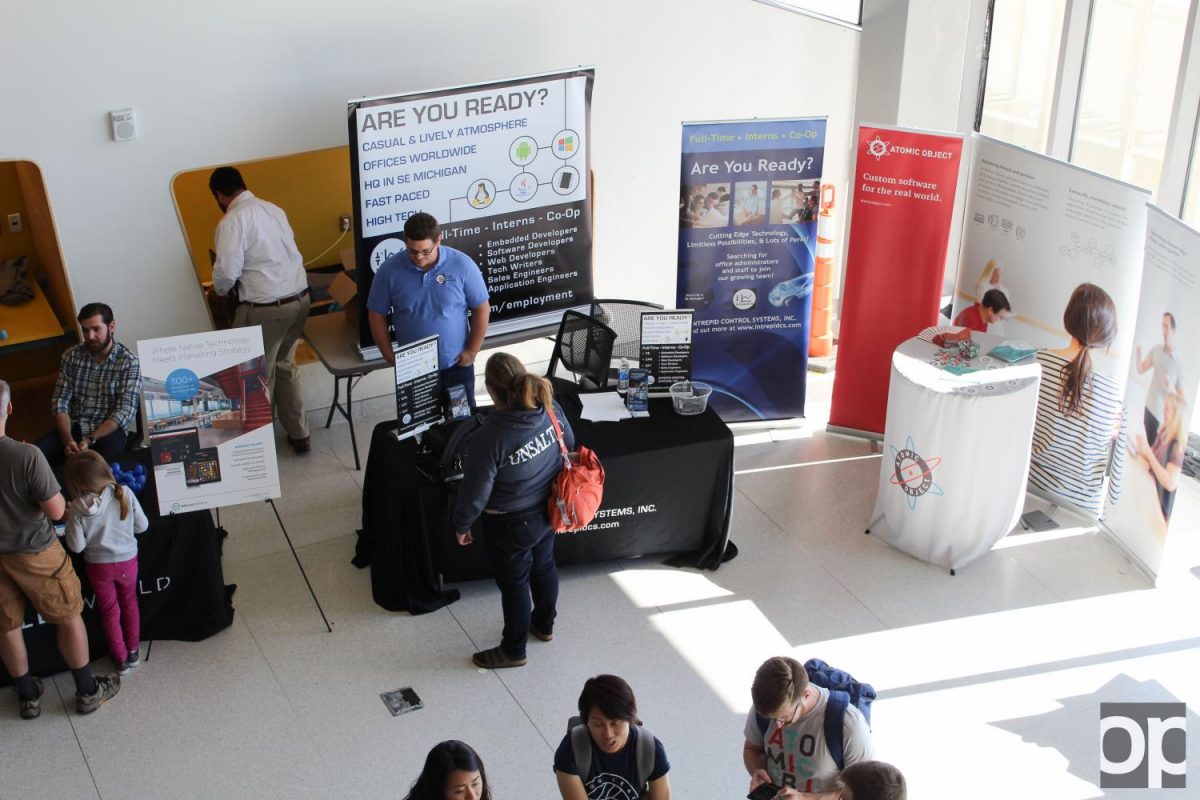OU’s Second Annual Hackathon
Students gather in the Science and Engineering Center for Grizzhacks from Saturday to Sunday.
Hackathons may not be an event that many people are aware of, but according to Arpan Rughani, former president of Oakland University’s League of Engineers and Computer Scientists (LECS) and GrizzHacks organizer, social media titan Snapchat was actually invented at one.
LECS hosted its second annual hackathon, GrizzHacks 2, in the Science and Engineering Center from Saturday, Sept. 30 at 10 a.m. to Sunday, Oct. 1 at 4 p.m.
“I would describe a hackathon as a tech event where you can create whatever you want, learn how to code if you don’t know how to code (and) make new friends,” said Rohit Timmagi, president of LECS and the main sponsorship director.
Around 160 competitors, some from as far as places like Ohio and Philadelphia, attended the event and worked in teams to build the best possible project over the 24-hour period.
Rughani said that nearly 60 percent of the attendees had never experienced a hackathon before.
“We want to be competing with University of Michigan (and) Michigan State, that hey we are not a small computer science school, we are actually at your level,” he said. “We can pull off big events and we raised around 18-20 thousand for this weekend.”
A panel of judges, all OU alums, ultimately decided the first, second and third place winning teams. Their consecutive prizes included Google Homes, Echo Dots (2nd Generation) and all-new Fire Seven Tablets with Alexa.
“It took them half an hour to 45 minutes to get the decision because there was so many great projects,” Rughani said. “We had 33 project submissions and picking the top three was the hardest challenge for them.”
The first place team consisted of John Brooks, Erald Bardhollari and Chase Ehlert. Their project is called the Daydream Detector (aka Anti-sleep 5000), and is essentially an Android app that measures the level of a person’s drowsiness based on his or her blink rate and then determines if he or she is too tired to drive.
“It’s [GrizzHacks] a great place to go with your friends of some of your peers in the program you’re enrolled in at school to figure out a project and solve problems and work together and produce something at the end,” Ehlert said. “For us, we had no idea we would get top five and then first place, so anything can happen.”
The title of second place went to the project FishNet, created by Bradley Chippi, Nathan Johnson, James Wetter and Trent Killinger. FishNet is way to tell exactly the species of fish that is on a person’s line by attaching the plastic shell to the line and then using Bluetooth to have it send updates to a phone.
Third place was claimed by Lily Suau, Troy Butzin, Kevin Huffman and Laith Rafidi for their project gyroDrone. Through wearing a glove, a person is able to control the drone using just movements of his or her hand.
Other highlights of the event included the potential to meet recruiters, tech talks with tutorials from sponsors and an autonomous car that attendees could drive around campus.
LECS plans to put on a GrizzHacks 3 next year, and is looking for volunteers from any major who are interested in technology to join the team.








Erika Allen • Oct 5, 2018 at 5:16 PM
Really great article!! I hear Arpan is a cool guy with a lot of ideas. I have been to a couple hackathons and he is always willing to help out other students!